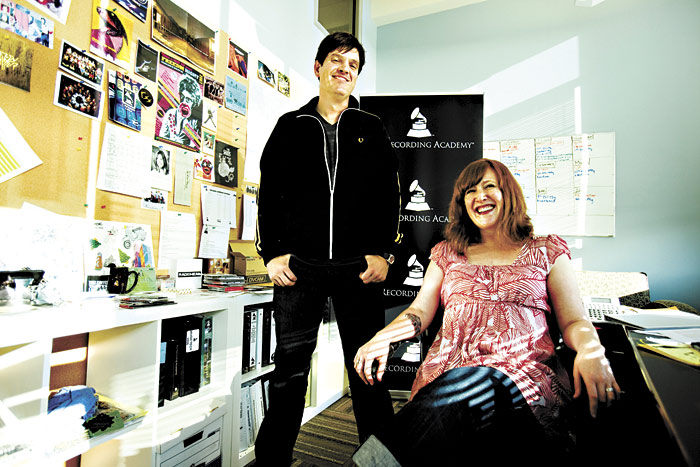Local music did not get off to a good start in 2009. In the first two weeks of the year, there was a fatal shooting at Chop Suey. A month or so later, another Capitol Hill venue, King Cobra, closed its doors for good. Club closures and random violence could only be blamed on the economy and the perpetrators, but they were troubling incidents that added to the general apprehension of the Seattle music community. And Mayor Nickels‘ disastrous, entrapment-oriented “Operation Sobering Thought” nightclub sting did nothing to reverse that trend.
The distrustful tone between Nickels’ office and the music community meant that dialogue about strengthening the city’s support for artists too often vacillated between defensiveness and miscommunication. When Nickels’ Office of Film + Music unveiled its Seattle City of Music Initiative in late 2008, the guarded skepticism with which many local promoters, artists, journalists, and club owners greeted it carried into early 2009.
But though our gorgeous summer has now morphed back into a more familiar pattern of chilly grayness, the forecast for the Seattle music community feels brighter and warmer than any time in recent memory. Part of this is due to people like Office of Film + Music director James Keblas and program coordinator Rachel White, who’ve worked tirelessly to bridge the gaps between the music community and more conservative factions within the mayor’s office. While Keblas continued to push for more tangible manifestations of the mayor’s Seattle City of Music Initiative, White compiled an exhaustively detailed yet user-friendly Nightlife Handbook, designed to help club owners navigate the perplexing maze of licensing and regulation requirements. White’s tome also provides advice on how to improve neighborhood relations and cope with the impending expenses of the new sprinkler requirements, set to take effect in December.
It’s also undeniable that the music community has begun to excel at making its voice heard. When Nickels included a promise to help push through an admissions-tax exemption for clubs, it was this constituency who held him accountable (the exemption took effect in July). Assertive activists like reliable rabble-rouser/hip-hop manager David Meinert and Seattle Music and Nightlife Association president/club owner Quentin Ertel have continued to educate the community about issues that directly impact them, whether it’s the PR disaster of Operation Sobering Thought or the high stakes of the upcoming mayoral and city attorney races.
On Wednesday, October 14, the inaugural Seattle City of Music Awards will be held at the Showbox, honoring veteran producer and Seattle native Quincy Jones, breakthrough local band Fleet Foxes, and nonprofit radio station KEXP, an influential institution I’m proud to call my second employer. This ceremony is the unofficial kickoff of the fourth annual MusicTech Summit, taking place this Thursday and Friday, Oct. 15–16, at EMP. Originally conceived by the Pacific Northwest Chapter of the Recording Academy, the Summit has grown into a must-attend event both for artists and the industry-related forces around them.
“We were trying to figure out the best way the Academy could support the community here,” says PNW Recording Academy executive director Ben London, recalling the impetus that led to the first summit in 2005. “We were really well aware of the transitions that were happening within the music industry back then, and people were just trying to figure out what the hell was going on and what they were going to do. One of the things that we’re best at is doing education programs, and since there was such a cry for help—for lack of a better term—we thought we could use our organization as a conduit to bring people together to figure out how to keep making music, put it out, and hopefully empower people to be able to take control of their own careers.”
Despite the formality associated with a professional conference focused on technology, MusicTech is not exclusively for upper-level executives. “What’s important is that there really is a little something for everybody,” adds senior program director Michael Stephens. “There are things as simple as how to make the most effective Web site for your band and managing a budget for a record release, to more in-depth topics, such as the Recording Academy’s new social-networking site, GRAMMY365.”
“We are trying to make things a little more vocationally focused,” affirms London. “There’s definitely a place for more ‘blue-sky’ discussions about where things might go in the next 10 years, but we also wanted to do things like show people how they can put out a record even if they only have $5,000 [or less].”
Perhaps what’s most heartening about all this kudos-dispensing is that no one’s lost sight of the need for vigilance and keeping a watchful eye on the future. To wit, the Summit will feature a debate between mayoral candidates Mike McGinn and Joe Mallahan, starting at 3:30 p.m. this Thursday. “That will focus on music and nightlife issues, of course,” says Stephens. “And that [part of the conference] is completely free and open to the public.”








